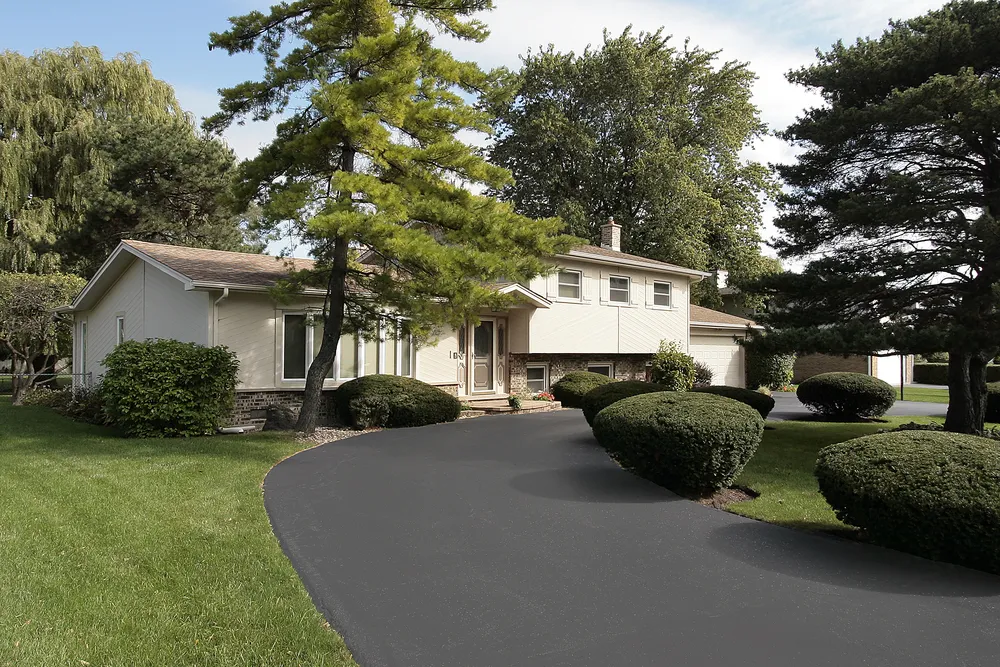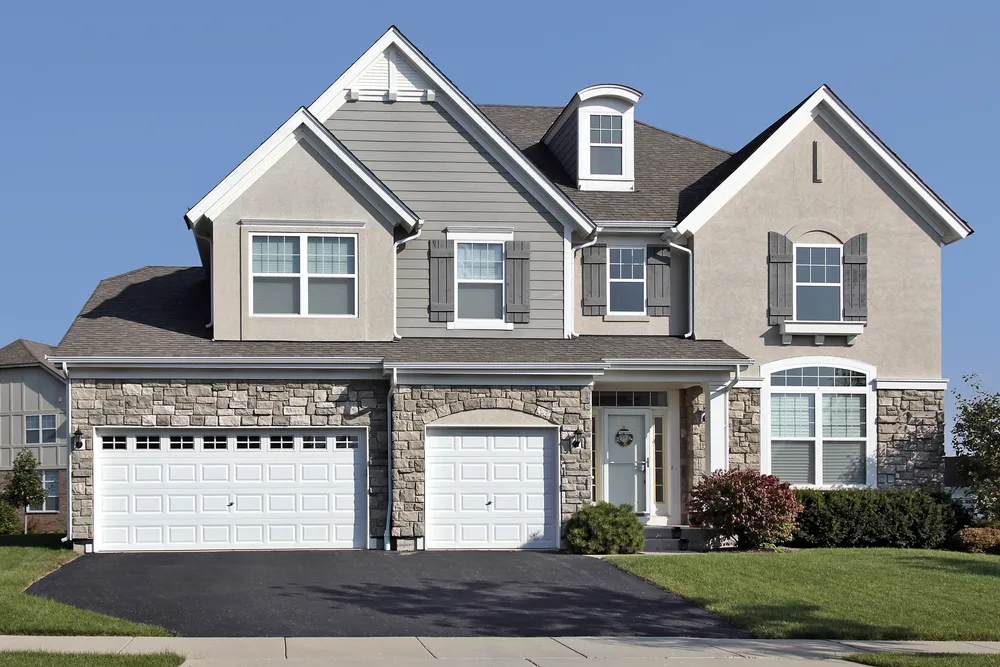Asphalt driveways are growing in popularity and for good reason. They are sleek, easy to install, and come in a range of options that can fit almost any budget.
In this blog post, we’ll explore the many advantages of asphalt driveways, from their curb appeal to their durability and cost-effectiveness.
We’ll also compare asphalt to concrete, outlining the pros and cons of each material so that you can make an informed decision about which one is right for your home.
Whether you’re planning a new driveway installation or considering replacing an existing one, this post will help you make an informed decision.
What Is the Appeal of Asphalt Driveways?
Homeowners upgrading their landscaping are opting for asphalt driveways for their curb appeal. Asphalt driveways are inherently smooth and elegant, making them an excellent choice for homeowners who want to improve their property’s appearance. The dark surface of asphalt driveways complements a well-painted house or lush lawn, enhancing the overall aesthetics of your home.
Asphalt’s popularity as a paving material is also due to its installation time, which is shorter than that of concrete or stone pavers. Asphalt is a flexible material that is easier to install and seal than concrete, which can develop concrete cracks from heat. Due to its absorbency, surrounding grass beds grow into asphalt more easily, making it the perfect choice for homeowners who want a seamless transition between the yard and the driveway.

Various Asphalt Types and Their Advantages
Driveways and parking lots often employ asphalt and concrete, two popular driveway materials. Each has advantages, but their differences may affect which material is the best choice for your project.
Asphalt takes a day or two to install, whereas concrete takes a week to cure. Asphalt layers are usually 40% cheaper than concrete layers, making asphalt the material of choice for budget-conscious homeowners.
Asphalt outperforms concrete in cold climates because it is more resistant to salt and ice melt damage. Due to deicing agents, asphalt won’t degrade as quickly in snowy or cold situations. Asphalt is superior at withstanding heavy vehicle traffic, making it one of the more durable materials for driveways.
Questions About Asphalt Driveway Costs
The initial cost of a new asphalt driveway is impacted by factors such as property size, location, and square footage. Driveway length, width, and slope also affect the cost.
A larger area or a more sophisticated design will require more materials and labor, increasing the overall cost. Remote installations may also require additional labor for transportation.
Most driveways cost $4–8 per square foot to build. However, factors like driveway size and location might significantly increase this amount. To preserve your driveway’s structure, proper drainage methods must be addressed.
Overall, precise driveway estimates can help you budget for a new asphalt driveway while taking into consideration the various factors that affect its cost.
Are Asphalt Driveways Safe for the Environment?
Asphalt is a popular pavement material for driveways and other outdoor surfaces. Each form has pros and cons. Recycled asphalt is environmentally friendly since it uses recycled materials.
It’s cheaper at $10–20 per ton. However, recycled asphalt doesn’t have the same appearance as fresh asphalt, which may make it a less attractive choice for those seeking a darker color.
Stamped asphalt adds texture and visual appeal to your home. Depending on design complexity, it costs $12–17 per ton. Due to its aesthetics and durability, this alternative may be preferable to recycled or recovered asphalt for those willing to pay more upfront.
Before buying this product, discuss mixing pavement materials with your contractor.
Asphalt vs. Concrete: Which one is better for you?
Concrete and asphalt are popular choices for driveway materials, each with merits and cons. Asphalt and concrete are just sand and stone held together by tar or cement adhesive.
Asphalt pavement is cheaper than concrete, so it may be better for budget-conscious buyers. Before choosing, consider the major differences between asphalt and concrete.
Concrete is more decorative than asphalt since it comes in many colors, forms, and finishes. Asphalt and concrete are also weatherproof. Asphalt fractures with time, but proper maintenance can prevent damage.
Concrete is thicker and more tightly sealed, so water damage is less likely. Asphalt can break in extreme cold, making repairs difficult. Hardened concrete can withstand strong winter conditions and requires less maintenance. When choosing a material primarily on price, consider its benefits.
Asphalt suffers in hot climates, while concrete struggles in freezing cold.
Asphalt or concrete for your home depends on climate. Asphalt works well in moderate climes since heat makes it mushy and sticky in summer. The black color of asphalt makes it more susceptible to damage in hot weather.
As asphalt shrinks and expands, it bends and cracks. Concrete heaves and cracks more than asphalt in the high cold.
If not maintained, salt used to melt ice on concrete can develop pits, stains, and other discoloration. Concrete melts snow slower than asphalt because it’s cooler.
Before choosing asphalt or concrete, consider your local weather.
Asphalt works well in mild climates, but concrete should not be laid in colder climates without expensive safeguards. In warmer climates, severe heat can distort asphalt roads.
You may choose the best paving material with proper planning.
Every few years, asphalt needs to be sealed with asphalt sealant, but concrete stains more easily.
Sealing asphalt driveways every few years protects them and extends their lifespan. Most homeowners can easily seal their driveways with hot asphalt sealer.
On a clean, dry road, pour and squeegee the sealer. Sealing concrete driveways is optional, but it preserves colored pads.
Asphalt is darker and matte, so it hides stains better than concrete. Both can accumulate dirt and engine oil if not cleaned and degreased regularly.
Concrete marks are easier to notice than asphalt marks, but regular care should avoid stains and discoloration and maintain your driveway in good condition. Hence, regardless of the material, driveways must be cleaned and oiled periodically to last.
Asphalt is easier to repair than concrete but needs it more frequently.
Asphalt driveways and sidewalks are cheap and easy to repair, thanks to the lower labor costs involved. Concrete is stronger yet difficult to repair.
Asphalt wears down faster than concrete since it’s softer and more susceptible to harm for longer. Asphalt crack repairs are easier than concrete ones.
Sadly, this implies damage must be repaired more regularly if not immediately.
Crack filler and patching material can make asphalt repairs look seamless. An asphalt seal coat can even repair sun-damaged or cracked streets. Use more materials to repair concrete fractures.
This makes hiding repairs tougher. Resurfacing the concrete may be necessary to hide the patches after filling them.
Even though asphalt is easier to fix than concrete, it needs to be fixed more often.
Asphalt driveways are popular due to their cost, durability, and variety of colors and patterns. Despite these benefits, asphalt does require periodic maintenance in order to look its best and last as long as possible.
Asphalt cracks more easily than concrete due to severe temperatures or sinking ground. It’s softer than concrete and less elastic.
Asphalt driveway repairs are simple. Sealants can stop water from entering earth structures through cracks.
Re-bedding potholes helps strengthen the surface. If there’s oxidation or fading, add a new sealant or a driveway resurfacing product.
On asphalt, you can drive pretty quickly, but you have to wait for concrete to set.
Installing a concrete driveway takes longer to cure properly. Concrete driveways must be used one week after installation, unlike asphalt ones. A freshly laid concrete driveway should not be used for at least 7 days due to weather and concrete mix issues.
Concrete driveways are strong after curing. With frequent sealing and repairing, they can last over 25 years with minimal maintenance.
Conclusion
Asphalt driveways have become increasingly popular among homeowners for their aesthetic appeal, ease of installation, and durability. While concrete driveways offer more decorative options and tend to last longer, asphalt is a more affordable and practical choice for those living in moderate climates.
When it comes to maintenance and repair, asphalt requires more frequent attention than concrete, but repairs are relatively straightforward and can help prolong the lifespan of the driveway.
Ultimately, the choice between asphalt and concrete will depend on a variety of factors, including climate, budget, and personal preferences.
By carefully evaluating these factors and weighing the pros and cons of each material, homeowners can make an informed decision about which one is right for their home.
Choose Nathan’s Paving for Reliable Asphalt Repair and Installation in Harrisburg, PA
If you’re in Harrisburg, PA, and looking for the best option for homeowners when it comes to blacktop driveways and asphalt repair, look no further than Nathan’s Paving. Our team of experienced asphalt contractors has been serving the area for years and is dedicated to providing top-quality services for all your residential driveway needs.
Contact us today to schedule a consultation and see why we are one of the leading asphalt driveway companies in Harrisburg. Choose Nathan’s Paving for a beautiful and functional driveway that will last for years to come.
